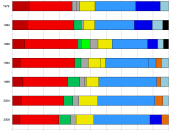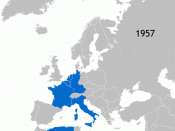1. Why the European Union?
Peace
The idea of a united Europe was once just a dream in the minds of philosophers and visionaries. Victor Hugo, for example, imagined a peaceful 'United States of Europe' inspired by humanistic ideals. The dream was shattered by two terrible wars that ravaged the continent during the first half of the 20th century.
But from the rubble of World War II emerged a new kind of hope. People who had resisted totalitarianism during the war were determined to put an end to international hatred and rivalry in Europe and to build a lasting peace between former enemies. Between 1945 and 1950, a handful of courageous statesmen including Konrad Adenauer, Winston Churchill, Alcide de Gasperi and Robert Schuman set about persuading their peoples to enter a new era. There would be a new order in western Europe, based on the interests its peoples and nations shared together, and it would be founded upon treaties guaranteeing the rule of law and equality between all countries.
Robert Schuman (French Foreign Affairs Minister) took up an idea originally conceived by Jean Monnet and, on 9 May 1950, proposed setting up a European Coal and Steel Community (ECSC). In countries that had once fought each other, the production of coal and steel would be pooled under a shared authority - the 'High Authority'. In a practical but also richly symbolic way, the raw materials of war were being turned into instruments of reconciliation and peace.
This bold and generous move was a big success. It was the start of more than half a century of peaceful co-operation between the member states of the European Communities. With the Treaty of Maastricht in 1992, the Community institutions were strengthened and given broader responsibilities, and the European Union (EU) as such was...


